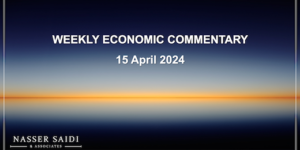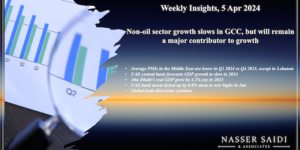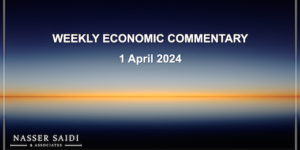Markets
Last week developed markets were rather subdued due to dismal GDP data from Europe while emerging markets gained substantially. Regional markets were all flat or positive with the exception of Oman. The euro lost again ground in expectation of monetary easing by the ECB in June which, given the weakness of the eurozone economy, might be stronger than anticipated. Oil prices were on the rise but without breaking out of the long-term range, while gold gained from continued tensions in Ukraine and unrest in Turkey.
Global Developments
US/Americas:
- US retail sales grew a paltry 0.1% mom in Apr after jumping 1.5% in Mar. Excluding cars, sales were little changed, compared with expectations of a 0.6% increase.
- US business inventories increased 0.4% mom in Mar, vs Feb’s 0.5%. Retail inventories were flat, manufacturing inventories almost flat at 0.1%, but wholesale inventories gained 1.1%.
- US consumer prices increased 0.3% mom sa (2.0% yoy) in Apr driven by rising food and gas prices. Excluding volatile food and energy components, prices rose 1.8% yoy in Apr.
- US industrial production unexpectedly fell by -0.6% mom in Apr following strong gains Mar (0.9% mom) and Feb.
- US housing starts surged 13.2% in Apr – the most in five months – to a seasonally adjusted annual pace of 1.07 mn. Building permits rose 8% mom to the highest pace since summer 2008.
- US initial jobless claims unexpectedly increased last week by 24k to a seven-year low of 297k. The four-week moving average fell by a marginal 2k to 323,250.
Europe:
- Eurozone GDP grew by a meek 0.2% in Q1 (0.9% yoy), pushed by a 0.8% qoq growth in Germany. France GDP remained flat qoq in Q1 compared to +0.2% in Q4. Private consumption slumped 0.5%. Italy did even worse with GDP contracting -0.1% qoq, in Q1 vs a +0.1% in Q4. Spain on the contrary recorded a positive growth of 0.4% qoq, the strongest quarterly growth rate since 2008.
- The German ZEW index of stock analysts’ confidence fell in May to 33.1 points from 43.2 in Apr, the largest drop in two years. The ZEW indicator for the current situation however advanced to 62.1 from 59.5. The ZEW measure for the euro zone retreated to 55.2 in May from 61.2 in Apr.
- Eurozone industrial production unexpectedly fell by -0.3% mom (-0.1% yoy) in Mar following a 0.2% gain in Feb.
Asia and Pacific:
- Chinese banks issued 774.7bn in new Yuan loans in Apr, coming in below expectations and slowing from the 1.05 trn level seen in Mar. The M2 money supply rose at a faster-than-expected 13.2% yoy in Apr.
- China retail sales grew 11.9% yoy in Apr, the slowest expansion since Dec 2008.
- China industrial output increased in Apr 8.7% yoy, slightly down from 8.8% in Mar. Last month’s expansion rate was the slowest since April 2009.
- China’s fixed-asset investment increased 17.3% in the first four months of the year, the slowest for the period since 2001. Home sales fell 9.9%.
- Japan’s GDP expanded by a more-than-expected 1.5% qoq (5.9% ann.) in Q1, accelerating from a downwardly revised 0.2% qoq in Q4. Private consumption surged 2.1% qoq – the fastest pace in more than a decade – ahead of a tax hike in Apr, and capital spending outstripped expectations expanding 4.9% qoq.
- Japan’s consumer confidence fell slightly in Apr to 37 from 37.5 in March, the lowest since Aug 2011. Given that a reading below 50 indicates consumers are pessimistic, it is unlikely that consumption will be a driver of recovery. Survey respondents gave their outlook for income growth a score of 37.
- In India, the BJP won an absolute majority in Parliament while Congress secured only 44 seats, less than a quarter of its previous total. The new Prime Minister Modi is expected to deliver on his promises to liberalize the economy and root out corruption.
- Wholesale prices in India increased 5.2% yoy in Apr, down from 5.7% in Mar.
Bottom line: The GDP data in the Eurozone and the spate of data from China represent another cold shower on hopes of a global rebound. France and Italy –which refuse stubbornly to enact long delayed structural reforms — are sinking deeper, while countries subject to externally imposed discipline such as Spain, Portugal and Ireland are at a turning point. Global bond rates dropped to their lowest levels of the year, but announced monetary stimuli by the ECB are unlikely to revamp growth. Chinese President Xi Jinping said last week that the nation needs to adapt to a “new normal” of weaker growth, adding that China’s fundamentals haven’t changed and the country offers a “strategic opportunity”. At the same time, the government must prevent risks and take “timely countermeasures to reduce potential negative effects”. In particular China needs to shift gear from overinvestment, high debt, overcapacity, but new growth drivers such as urbanization and consumption – are not yet ready to lead economic growth.
Regional Developments
- MSCI reclassified Qatar and UAE to emerging market from frontier-market status as expected. Qatar will have a 0.47% weight, while UAE will have 0.58%. MSCI added 10 Qatar companies and nine UAE companies to the all world index and to the emerging markets index. Qatar National Bank SAQ, Industries Qatar QSC and National Bank of Abu Dhabi PJSC will be the biggest additions.
- Bahrain’s non-oil sector growth will be supported by the banking sector’s liquidity and low loan-to-deposit ratios, delay in incremental government spending as well as the launch of infrastructure projects worth USD 4.43bn, as per Economic Development Board’s latest report.
- Oil product shipments into Egypt from Saudi Arabia will total USD 2.8bn by the beginning of Sep, revealed the former’s oil minister, with grants averaging USD 1.2bn in Q2 and a further USD 700mn to be distributed in July and August. Separately, the head of Egyptian General Petroleum Corp was quoted saying that “Saudi petroleum aid to Egypt will be more than USD 3bn from April until the end of August”.
- An electric power grid project linking Saudi Arabia and Egypt is in its final stages of study and could be available for bidding as early as next year. It was stated that once initiated, the project could be realized in the next three years.
- Tourists into Egypt fell 32.4% yoy to around 755k visitors in March, as the ongoing political turmoil drags along. With elections scheduled to happen later this month, the tourism ministry recently launched a three-year marketing campaign to attract tourists and investors to the country.
- Iran-Iraq trade volume is expected to grow to USD 20bn in value within the next three years from USD 12bn currently, says the former’s Ministry of Economy and Finance.
- In advance of summer’s rising energy demand in Kuwait, the country signed a five-year LNG supply deal with BP at an estimated USD 3bn. The country also agreed to a USD 12bn LNG supply deal over six years with Royal Dutch Shell and will also import gas from Qatar.
- The IMF forecasts growth in Lebanon to touch 2% this year and rise to around 4% over the medium term, while also warning that the country should “urgently strengthen policies” and its fiscal priority should be to “put public debt on a sustainable downward path” amidst “resilient” banking.
- Oman’s robust growth was highlighted during a workshop held by the IMF, also highlighting the strong performance of banks with an average return on assets of 1.6%, return of equity of 11%, capital adequacy ratio of 16.2%, and gross non-performing loans of 2.1% as of Dec 2013.
- At least three Omani companies – based in construction, property development, telecommunication and logistics services – are planning to raise funds (with each aiming for more than OMR 100mn) for expansion via Sukuk, according to an Islamic scholar.
- IPOs of the two largest and most efficient power plants currently in operation in Oman, Al Batinah Power Co and Al Suwadi Power Company, opened for subscription on May 11 and will close on June 9. They aim to raise a combined OMR 62.7mn through sale of 35% of each company.
- Qatar’s cost of living index was up 2.8% yoy and 0.2% mom in April, thanks to higher rents (+6.3% yoy), rising prices of transport and communication (+1.2%) and food, beverages and tobacco (+0.6%). Excluding rents, cost of living grew only 0.1% mom and 1.6% yoy in Apr.
- Qatar’s Interior Ministry, as part of labour reforms, announced plans to end the sponsorship system for expats and replace it with a “system based on employment contracts”. However, there is no mention of minimum wages or trade unions or a timetable for enforcement of reforms.
- Bilateral trade between Qatar and South Korea totaled USD 26.72bn last year, with electronics, automobiles, and assorted machinery the largest imports into Qatar.
- Qatar’s regulators plan to set up a deposit insurance framework (including a Sharia-compliant version) under the central bank law, with an aim to start implementation by 2016. As per the strategy plan, “at a later stage, consideration will be given to developing a risk-based premium mechanism”.
- Saudi Arabia’s foreign minister revealed that an invitation had been extended to his Iranian counterpart to visit the Kingdom, also adding that “any time he sees fit to come, we are ready to receive him”.
- As demand for energy rises, Saudi Arabia’s Ministry of Water and Electricity announced the awarding of projects worth USD 3.7bn, with an aim to save 40% of the consumed energy.
- Non-oil exports in Saudi Arabia grew 12.5% yoy to SAR 19.24bn in Mar, while imports dropped by 9.1% to SAR 51.19bn and petrochemicals accounted for 32.6% of non-oil exports at SAR 6.2bn. Major importers were UAE, China and Singapore, accounting for 13.8%, 11.4% and 7.7% of total value of exports respectively.
- A report from travel technology provider Amadeus predicts that the global travel sector is set to register an increase in visitor flow by 5.4% per annum over the next 10 years, while the Middle East will see a 11.9% rise.
UAE Focus
- UAE’s Finance Minister revealed that there are no plans for more financial aid to Egypt “for now”.
- The IIF expects UAE banking sector to benefit from the strong improvement in capitalisation levels, increase in profitability and further easing of liquidity situation, also ably supported by robust non-hydrocarbon growth, low interest rates and a further increase in real estate prices.
- Investments by Pakistani nationals in the UAE totaled USD 23bn alongside bilateral trade at USD 9bn, according to Pakistan’s Ambassador to the UAE. Separately, Dubai Land Department figures reveal that Pakistani investors were the third largest foreign buyers of property in Dubai, spending around AED 2bn in Q1.
- Dubai’s hotel occupancy rates grew 2.2% yoy to 84.8% in Apr while the revenue per available room was up 13.9% to AED 903.87.
- Dubai’s business confidence index indicated greater optimism as the index rose 22.3 points to 135.5 in Q1 this year; in addition to expected increases in sales volumes, 62% of the respondents also forecast an increase in new purchase orders.
Media Review
A bubble in European Private Equities?
http://www.ft.com/intl/cms/s/0/0211e7bc-d9bb-11e3-b3e3-00144feabdc0.html
IMF’s Lagarde on the Middle East
http://blog-imfdirect.imf.org/2014/05/10/from-rabat-to-amman/
Investors are piling up cash as never before in two years
http://www.ft.com/intl/cms/s/0/a90195aa-da9b-11e3-8273-00144feabdc0.html
Saudi Arabia is more forthcoming on peace with Iran
http://www.ft.com/intl/cms/s/0/49dae0e4-dab5-11e3-9a27-00144feabdc0.html
El Erian assesses the situation in Egypt
http://www.bloombergview.com/articles/2014-05-15/egypt-s-revolution-can-be-saved
Barclays and Qatar face deepening legal problems
http://www.ft.com/intl/cms/s/0/cda8004e-d7a1-11e3-80e0-00144feabdc0.html






